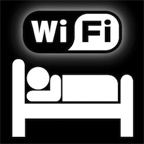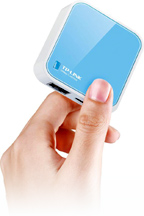Wednesday 14 January, 2015, 12:52 - Spectrum Management
Posted by Administrator
Back in October of last year, Wireless Waffle reported that Marriott hotels had been fined by the FCC for deliberately interfereing with Wi-Fi networks in an attempt to try and force guests at their hotels to use the hotel's own extortionately priced WiFi service.Posted by Administrator
 Earlier this month, the New York Times reported that several hotel chains have petitioned the FCC for permission to legally undertake such activities. The lengthy petition argues on several points that hotel operators (and other landlords) should be able to manage their networks to the extent that they can identify, and neutralise, anyone trying to offer WiFi services other than themselves, thereby maintaining a quality of service and level of security and safety for their users.
Earlier this month, the New York Times reported that several hotel chains have petitioned the FCC for permission to legally undertake such activities. The lengthy petition argues on several points that hotel operators (and other landlords) should be able to manage their networks to the extent that they can identify, and neutralise, anyone trying to offer WiFi services other than themselves, thereby maintaining a quality of service and level of security and safety for their users.The main tenets of their argumentation seem to be:
- That the type of sophisticated monitoring and enforcement activities they are proposing do not constitute harmful interference but are good network management practices;
- That their networks are established using best industry practices to maximuse performance and that non-approved WiFi hotspots mess about with this and degrade their service;
- That the Part 15 rules that allow users to establish WiFi hotspots require those users to be located on a property where the user has "direct or indirect ownership or leasehold" and that this does not apply to hotel guests.
It then goes on to liken a university applying bandwidth caps to student usage as being a similar network management practice, but one that no-one would argue with and therefore, by implication, the practice of neutralising the threat of miscreant networks should also just be considered best practice.
 Notwithstanding any of the above, WiFi networks, whether operating under the Part 15 rules in the USA, or in most other countries are permitted access to the radio spectrum on a 'non interference' basis. This means that they are not permitted to interfere with any other users, and that they must accept any interference caused by any other users. In effect, they have no protection from interference at all. What the hotels are trying to do is run a commercial grade wireless internet service in this spectrum. If this were possible, and it were possible to provide the quality of service that users would seek, would it not follow that the big commercial operators would want to do the same thing too. Free WiFi hotspots in a coffee shop is one thing, but trying to provide a guaranteed service is another.
Notwithstanding any of the above, WiFi networks, whether operating under the Part 15 rules in the USA, or in most other countries are permitted access to the radio spectrum on a 'non interference' basis. This means that they are not permitted to interfere with any other users, and that they must accept any interference caused by any other users. In effect, they have no protection from interference at all. What the hotels are trying to do is run a commercial grade wireless internet service in this spectrum. If this were possible, and it were possible to provide the quality of service that users would seek, would it not follow that the big commercial operators would want to do the same thing too. Free WiFi hotspots in a coffee shop is one thing, but trying to provide a guaranteed service is another. The hotel chains argue that when they enter into an agreement to provide services for, for example, a conference, they agree to some quality of service parameters for their WiFi service. This is their own silly fault! It's like guaranteeing your guests that it won't rain this week. It's not something that the hotel has control over. Not least, the WiFi bands are used by a myriad of other, non-WiFi devices, that could equally upset the performance of the hotel's WiFi networks including their very own microwave ovens!
The hotel chains argue that when they enter into an agreement to provide services for, for example, a conference, they agree to some quality of service parameters for their WiFi service. This is their own silly fault! It's like guaranteeing your guests that it won't rain this week. It's not something that the hotel has control over. Not least, the WiFi bands are used by a myriad of other, non-WiFi devices, that could equally upset the performance of the hotel's WiFi networks including their very own microwave ovens!One has to question whether these hotels would be so keen to conduct such complex network management if they offered their WiFi service for free. Hotel visitors should vote with their feet and choose hotels that do offer Free WiFi. Marriott and its friends would soon change their tune, not least as it appears that cheaper hotels have the best WiFi! Oh, and don't forget to take your Wireless Nano Router to set up your own network nice and easily too!
Post Script: It seems that just a day after writing this, the BBC report that Marriott has backed down. Was it something we said...?
add comment
( 296 views )
| permalink
| 



 ( 2.9 / 1257 )
( 2.9 / 1257 )




 ( 2.9 / 1257 )
( 2.9 / 1257 )
Tuesday 30 December, 2014, 12:48 - Licensed
Posted by Administrator
Japan. Country of Shinto serenity. Where cherry blossom floats down from tree-strewn parks during Hanami. Where tourists come to enjoy peaceful views of Mount Fuji.Posted by Administrator
Japan. Country of high-technology. Inventors of the pocket calculator, walkman, compact disc player and PlayStation. The first country to launch 3G mobile services.
Japan. Country of very weird pop videos. Where headless pink maids shimmy and where young girls spew out shadowy birds and multi-coloured eyeballs.
So what has all this got to do with anything radio-related. Well, if you can bear to watch it for that long before your brain turns to blancmange (or alternatively just fast forward to the relevant point), you will find in the video of PonPonPon by Kyary Pamyu Pamyu at approximately 2 minutes 30 seconds in (just after the eyeball spewing incident), a video cassette going into a TV, a TV mast growing and the screen of the TV turning snowy. This, believe it or not, is a tribute to the closure of analogue television in Japan.
Kyary Pamyu Pamyu - PONPONPON on Vimeo
Most countries have celebrated the closure of analogue television with announcements ranging from the upbeat to the sombre, montages of classic TV programmes, countdowns to zero hour, or even just snow replacing the picture mid-programme. As there are still a wide range of countries yet to complete the transition to digital TV (most of Africa, South America and Asia), Wireless Waffle challenges those countries (or their pop stars) to come up with an even weirder tribute than that of Ms Pamyu Pamyu!
Sunday 30 November, 2014, 11:02 - Radio Randomness
Posted by Administrator
It's easy to forget that the radio spectrum has been in use for over 100 years, but that then (as now!) communications has not always been wireless. Posted by Administrator
During World War I, teams of 'signals' engineers risked life and limb to lay down wires to allow communication between the front line and the headquarters.
"Signals From The Great War" takes the reader back to these times through a series of mémoires written by Archibald Gordon MacGregor RE MC combined to tell the story of a young signals officer's experiences on the front line in Belgium and France from 1917 - 1919.
Though the mémoires were written in 1968, almost 50 years after the events they are describing, the level of detail and clarity are impressive and the book makes for a fascinating read for anyone interested in finding out more about military communications before radio became the default means of information distribution.
It is gratifying to note that Lieutenant MacGregor received the military cross for his bravery.
Various news web-site including CNN and the BBC report that American Airlines flight 136 due to fly from Los Angeles to London on October 26 was delayed by almost a day when a passenger sitting on the aircraft noticed a WiFi network named 'Al-Quida Free Terror Nettwork'. As a result, the aircraft was emptied and a search conducted by US Customs and Border protection officials but the source of the offending WiFi signal was never found. No doubt the misspelling of 'Al Qaeda' and 'Network' enhanced the level of terror indicating, as it does, that the person who set up the network was potentially:
As the BBC notes:
 Back in 2007, Wireless Waffle undertook a survey of WiFi channel usage which found networks with such kooky names as 'Gary Barlow', 'Slapheads Network', 'Toast' and 'Fraudulent'. The practice of personalising WiFi network names (or SSIDs as they're technically known) is not a new one and whilst naming a network after a terrorist organisation is clearly a very bad idea (especially whilst at an airport) there's no law against it. If just setting an SSID to such a name can disrupt flights at a busy airport, then it opens the door to widespread misuse of, for example, the WiFi tethering options on mobile phones, to conduct all kind of Rabelaisian ruses.
Back in 2007, Wireless Waffle undertook a survey of WiFi channel usage which found networks with such kooky names as 'Gary Barlow', 'Slapheads Network', 'Toast' and 'Fraudulent'. The practice of personalising WiFi network names (or SSIDs as they're technically known) is not a new one and whilst naming a network after a terrorist organisation is clearly a very bad idea (especially whilst at an airport) there's no law against it. If just setting an SSID to such a name can disrupt flights at a busy airport, then it opens the door to widespread misuse of, for example, the WiFi tethering options on mobile phones, to conduct all kind of Rabelaisian ruses.
Many airports and other major venues and events (such as at the London Olympic Games) use radio spectrum monitoring equipment to check for people using unlicensed frequencies as the wireless landscape in such places is very complex with many networks sharing neighbouring frequencies. Careful planning is essential to ensure that the myriad of users do not interfere with each other (especially to the safety critical air-ground systems for example) and monitoring is vital in keeping the airwaves free of signals that could cause problems.
Maybe airports and other establishments that might be the target of people intent on causing havoc with their naughtily named WiFi SSIDs could take a leaf out of the book of Marriott and also install WiFi monitoring systems that would allow naughty network names to be traced and closed down before they caused multifarious mayhem.
- someone for whom English was not their first language;
- a dimwit whose IQ was far below average;
- someone with scant regard for spelling in an infidel's tongue; or
- a person deliberately trying to mask their true intentions by appearing as one of the above.
As the BBC notes:
Many broadband subscribers re-name their home wi-fi network to personalise it.
 Back in 2007, Wireless Waffle undertook a survey of WiFi channel usage which found networks with such kooky names as 'Gary Barlow', 'Slapheads Network', 'Toast' and 'Fraudulent'. The practice of personalising WiFi network names (or SSIDs as they're technically known) is not a new one and whilst naming a network after a terrorist organisation is clearly a very bad idea (especially whilst at an airport) there's no law against it. If just setting an SSID to such a name can disrupt flights at a busy airport, then it opens the door to widespread misuse of, for example, the WiFi tethering options on mobile phones, to conduct all kind of Rabelaisian ruses.
Back in 2007, Wireless Waffle undertook a survey of WiFi channel usage which found networks with such kooky names as 'Gary Barlow', 'Slapheads Network', 'Toast' and 'Fraudulent'. The practice of personalising WiFi network names (or SSIDs as they're technically known) is not a new one and whilst naming a network after a terrorist organisation is clearly a very bad idea (especially whilst at an airport) there's no law against it. If just setting an SSID to such a name can disrupt flights at a busy airport, then it opens the door to widespread misuse of, for example, the WiFi tethering options on mobile phones, to conduct all kind of Rabelaisian ruses.Many airports and other major venues and events (such as at the London Olympic Games) use radio spectrum monitoring equipment to check for people using unlicensed frequencies as the wireless landscape in such places is very complex with many networks sharing neighbouring frequencies. Careful planning is essential to ensure that the myriad of users do not interfere with each other (especially to the safety critical air-ground systems for example) and monitoring is vital in keeping the airwaves free of signals that could cause problems.
Maybe airports and other establishments that might be the target of people intent on causing havoc with their naughtily named WiFi SSIDs could take a leaf out of the book of Marriott and also install WiFi monitoring systems that would allow naughty network names to be traced and closed down before they caused multifarious mayhem.

